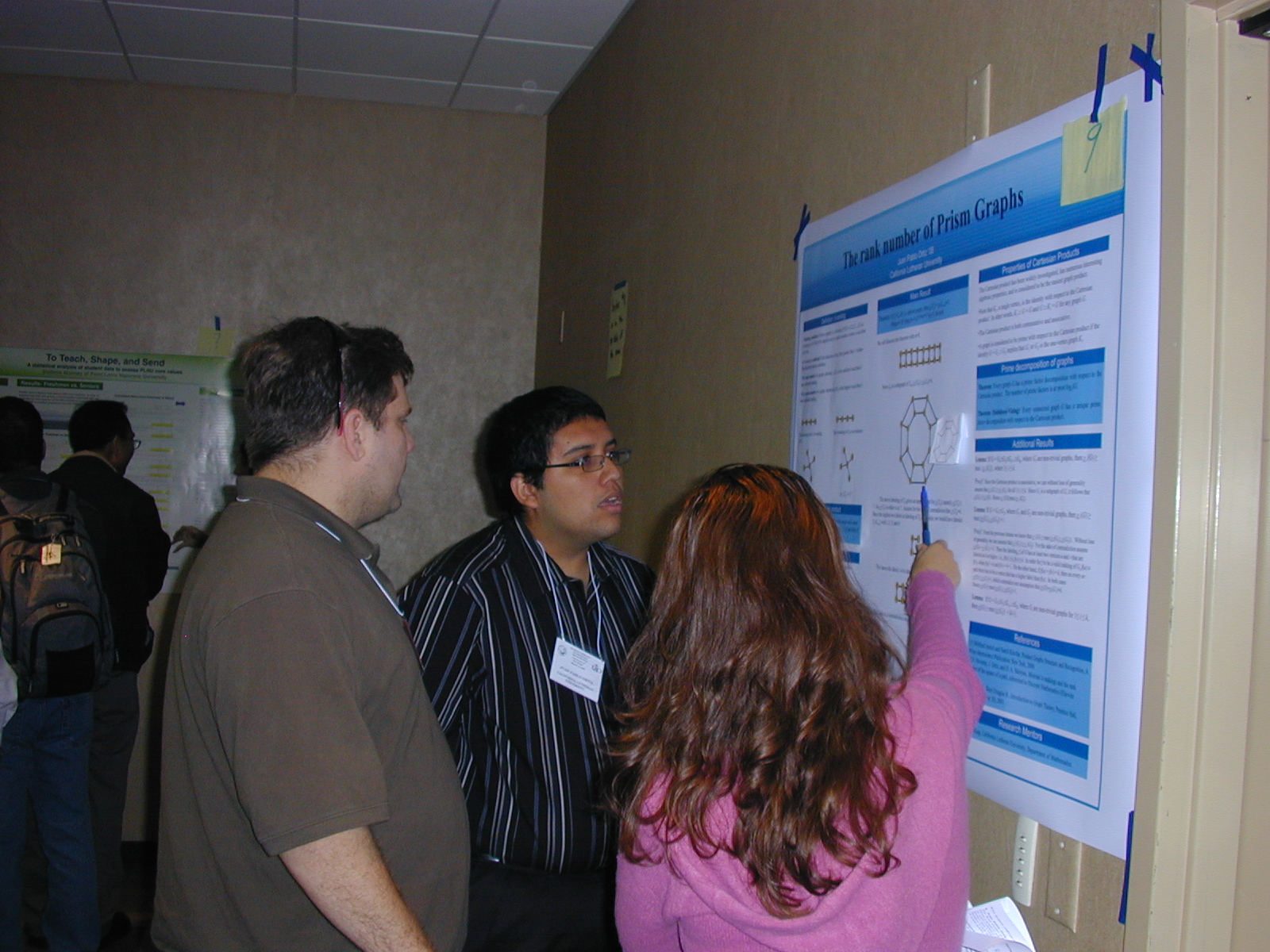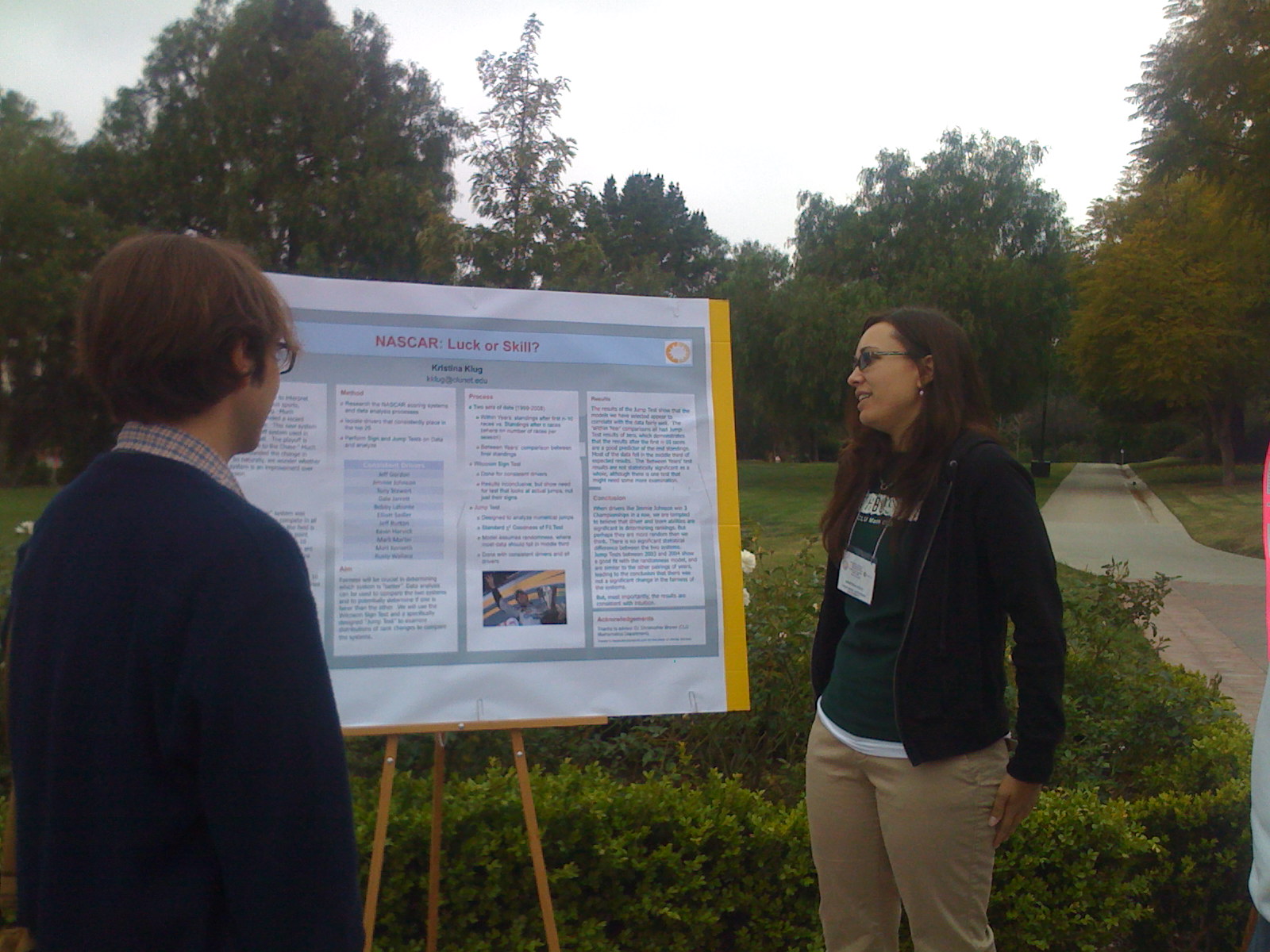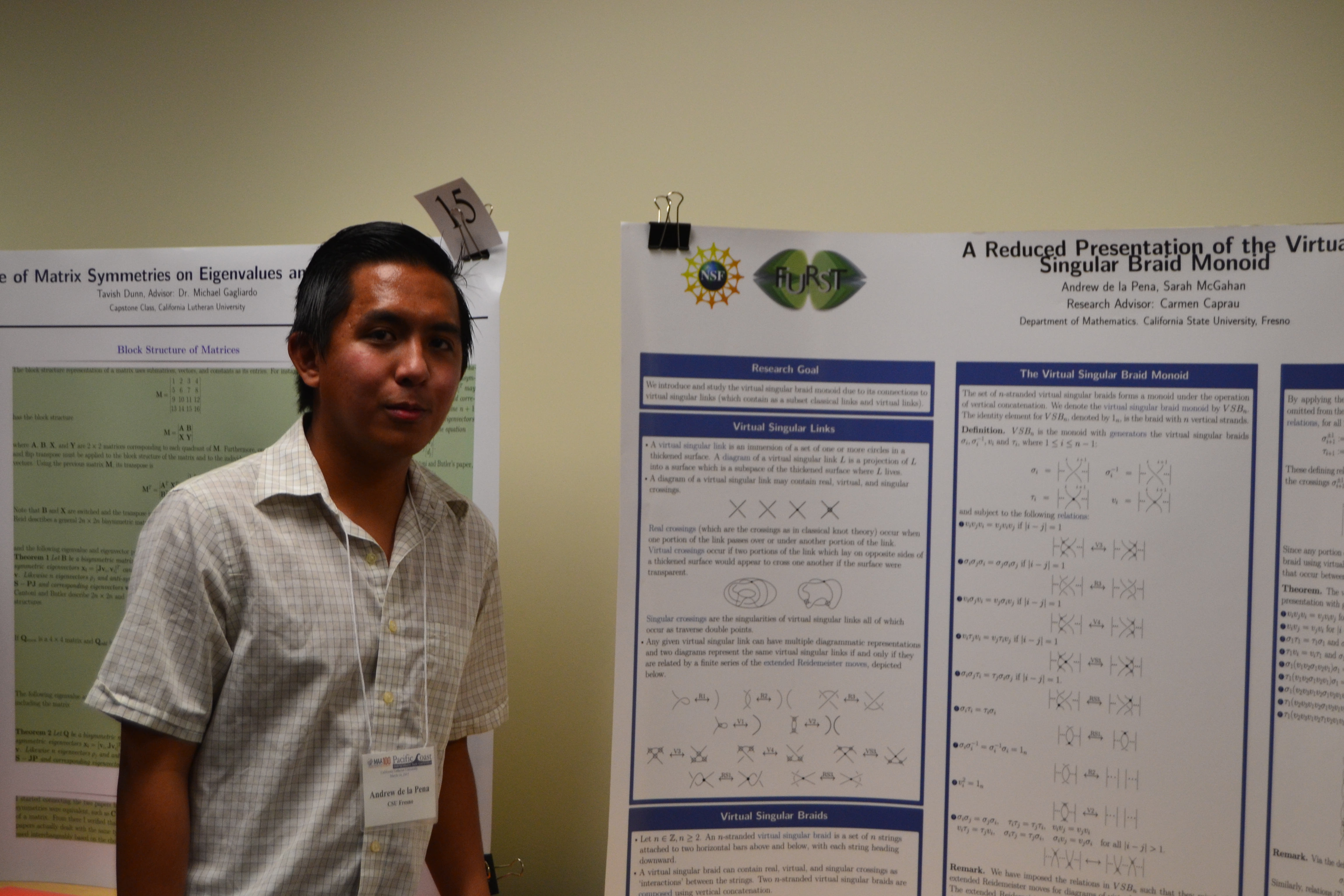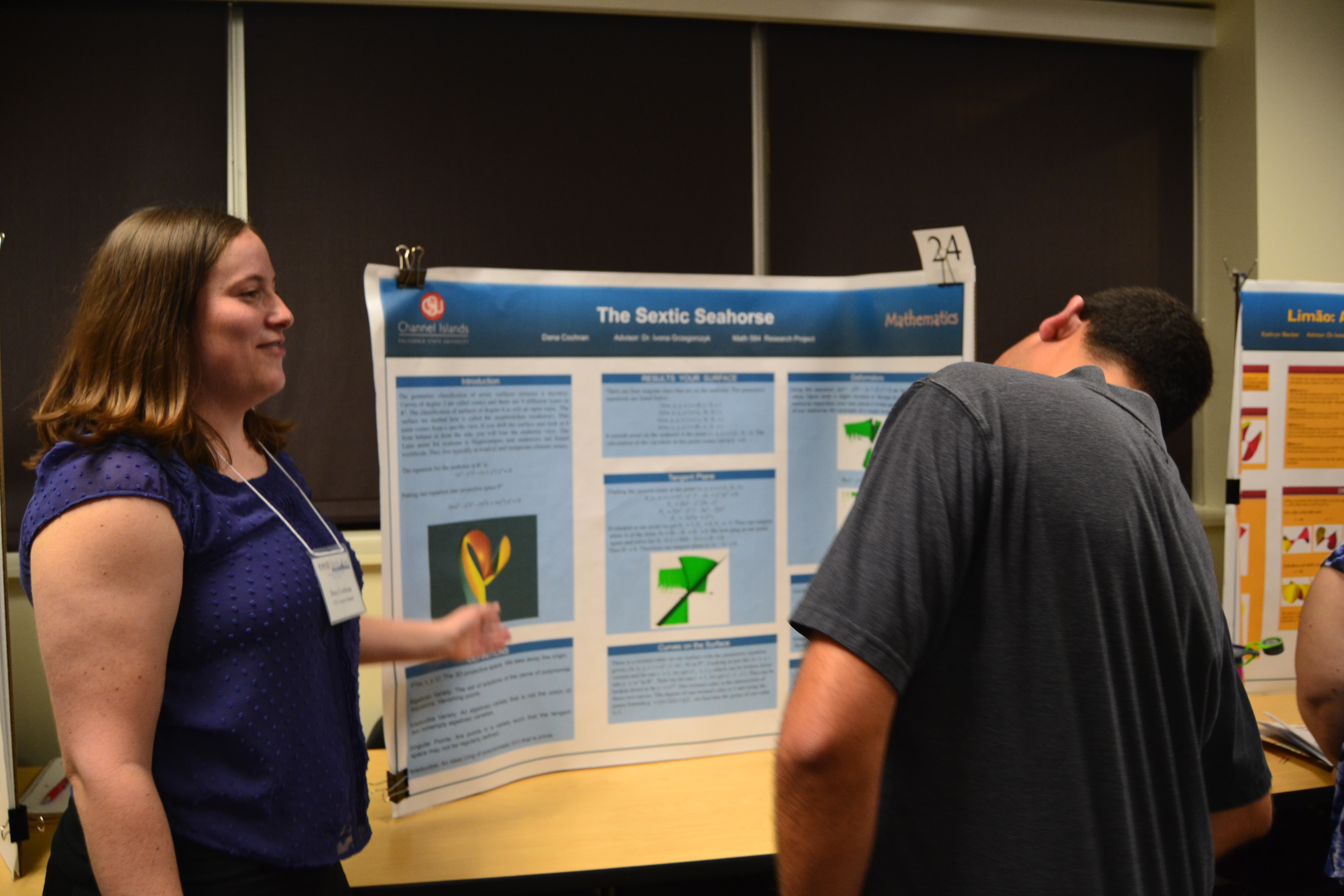Register
Registration is expected to open soon and will be able to be completed online with a credit card. Priority registraiton deadline is Wed April 8; online registration closes Tuesday April 14 at 2pm.
Students applying to present a poster register by submitting their application by Tues March 31th at 12 noon (More info)
Spring 2020 SoCal-Nev Section Meeting
University of La Verne
Saturday, April 18, 2020, 8:00am - 4:45pm (tentatively)
(Directions and Map)
Tentative Schedule
- 8:00-11:30am Registration
Foyer of La Fetra Lecture Hall - 8:00-10:00 Poster Presenter check-in
Foyer of La Fetra Lecture Hall - 9:10-9:15 Welcome Remarks
La Fetra Lecture Hall - 9:15-10:15 Invited Address by Tanya Tatarinova, University of La Verne
Mathematics as a language of… archeology (and not just for counting years)
La Fetra Lecture Hall - 10:15-10:30
Section Business Meeting
La Fetra Lecture Hall - 10:30-11:30 Student Poster Session
View the Call for Posters and apply on-line
Organized by Ryan DeMoss, California Lutheran University
- 11:30-12:30 Invited Address by Rob Rubalcaba, San Diego City College
a talk about MathJAM
La Fetra Lecture Hall - 12:30-1:45 Lunch
Location TBA - 12:30-1:45 SoCal-Nevada Section Board Meeting
Location TBA - 1:45 - 2:05 Presentation of activities of the Association for Women in Mathematics
La Fetra Lecture Hall - 2:15-3:15 Invited Address by Berit Givens, Cal Poly Pomona
Math and Craft: Knitting and Crochet Illuminate and Inspire Mathematics
La Fetra Lecture Hall - 3:15-3:30 Closing Remarks and Poster Awards
La Fetra Lecture Hall
Directions and Maps
Interactive Campus Maps and Driving Directions can be found on the University of La Verne Maps page or on our annotated pdf of the campus map.
Parking does not need a permit on Saturdays. The nearest parking lot is Lot B, but parking is also available in the Parking Structure D.
Registration Information
Priority Online Registration: register by Wed April 8 at 5pm for guaranteed lunch choice, printed name tag. Registering by the priority deadline minimizes stress.
Online Registration: registering by Tues April 14 2pm will get you a printed nametag and registration packet. You will also have the option to buy lunch, but might not have a full selection of choices, since our food order needs to be confirmed shortly after the priority registration deadline.
On-site Registration: Payment for on-site registration is limited to cash or check and costs more. Your nametag and reciept are not pre-printed. Lunch options may or may not be available depending on how many non-priority online registrations there were.
Registration Fees |
|
| Pre-Registration (priority deadline Wed April 8, 5pm; online registration deadline Tues April 14, 2pm) | |
| Nonmember | $50 |
| MAA Member | $45 |
| Student | $15 |
Student poster presenter (2 free registrations per poster included as part of the poster application process) |
$0 |
| Lunch: MAA Member, Non-member, or Student: see below for ordering choices |
add $10 |
| Lunch: Student presenter (max of two free lunches per presentation): see below for ordering choices |
$0 |
| Lunch Choices Lunch will be a choice of salad or sandwich. All meals come with Whole Fruit, Two House-baked Cookies and Ten Ounce Bottled Water. |
|
On-site registration will be available for the meeting, but will be $20 for students and $60 for non-students. On-site registration accepts cash or check only (no credit card).
Register on-line
Registration is expected to open by soon for online registration and payment by credit card. (deadline for online priority pre-registration is Wednesday April 8. Online registration closes on Tuesday April 14 by 2:00pm).
Students who have been accepted to present a poster do not need to register here as their poster application serves as their registration (max of two free student registrations per poster, additional student poster presenters above 2 do need to pre-register here).
Questions about registration
Questions about registration can be directed to Karrolyne Fogel, kfogel at callutheran.edu
Berit GivensCal Poly Pomona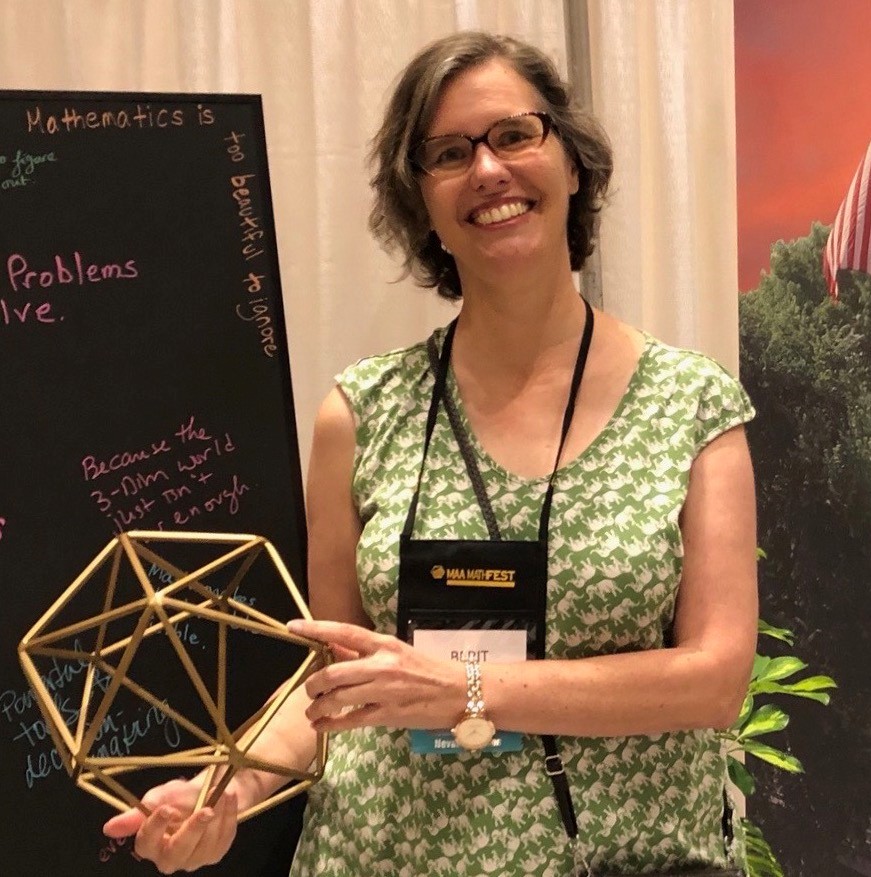 |
Dr. Berit Givens is Professor and Chair of the Mathematics & Statistics Department at Cal Poly Pomona. Since she received her Ph.D. in Mathematics from the University of Wisconsin, Madison, in set theory and logic, she has explored and published mathematical research on a range of topics, from the algebra of semi-groups to Poisson geometry. A devoted teacher, she enjoys sharing the beauty of mathematical subjects with students, colleagues, and friends, through courses and presentations on topics in algebra, geometry, and analysis. Dr. Givens started knitting when she was 12 years old, inspired by her Norwegian grandmother who knit sweaters for her many grandchildren and great-grandchildren. She has always been interested in various types of crafts, including cross-stitch and Hardanger embroidery, needlepoint, knitting and crocheting, or anything else that involves fabric, yarn, or thread. In recent years, Dr. Givens combined her love of knitting and mathematics with a chapter in the MAA-published book Figuring Fibers. |
Math and Craft: Knitting and Crochet Illuminate and Inspire Mathematics
Mathematicians have often made advances in mathematics inspired by classical problems in business and science. But mathematics can be applied to many other areas too, even those not traditionally thought of as mathematical. In this talk, I'll share some of the ways that my hobbies with yarn have both illuminated mathematical concepts for me and inspired me to explore new mathematical topics. First, crocheted models of the hyperbolic plane give a wonderfully tactile way to understand negative curvature and the Poincare disc. Then, a problem of designing knitwear using multiple textures inspired a project in extending the Chinese Remainder Theorem. The moral of the story is that mathematics can be found in unexpected places, and you can always be on the lookout for new and surprising ways to combine your love of mathematics with your other interests and hobbies.
Rob RubalcabaSan Diego City College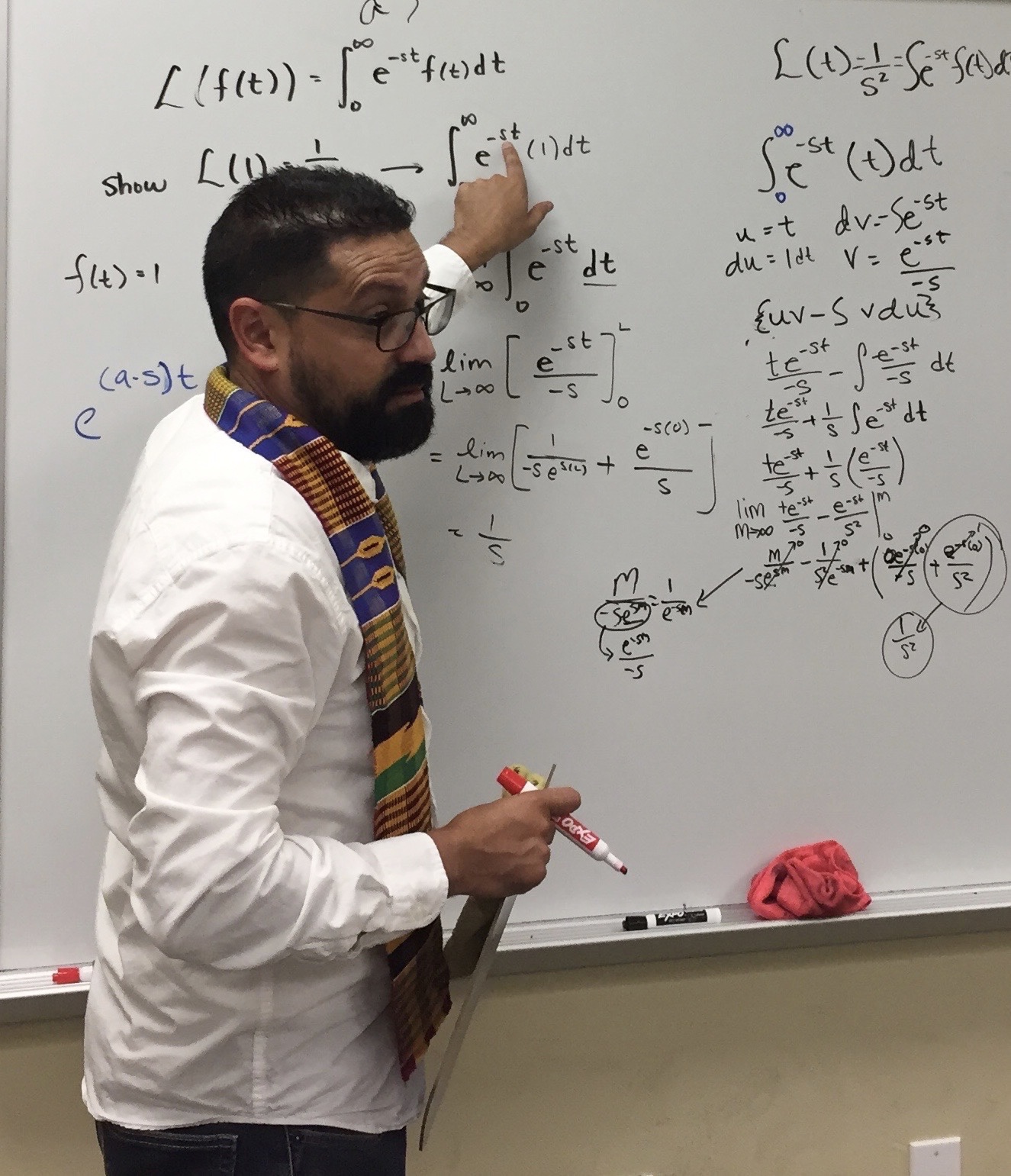 |
Dr. Rubalcaba's bio is forthcoming. |
Dr. Rubalcaba's Title TBA
Dr. Rubalcaba's abstract is forthcoming, but we suspect the topic will be about Math JAM.
Tanya TatarinovaUniversity of La Verne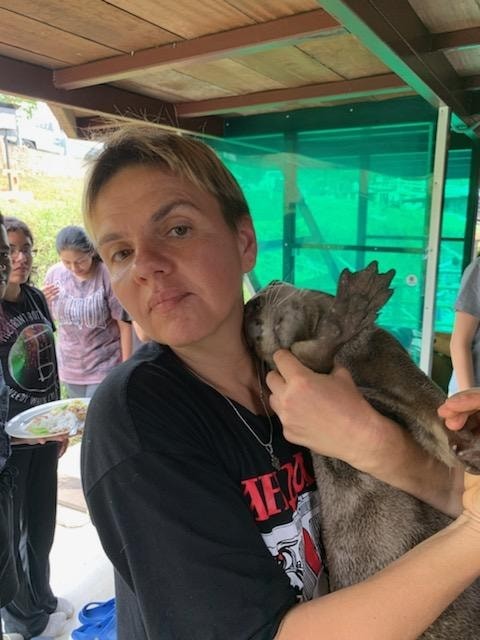 |
Tatiana Tatarinova holds the Fletcher Jones Endowed Chair in Computational Biology at the University of La Verne. She received her Diploma in Theoretical Physics from the Moscow Engineering Physics Institute, an M.S. in Physics from the University of Utah, and a Ph.D. in Applied Mathematics from the University of Southern California. Tatiana’s research focus is on the development of algorithms for the analysis of biological data. Tatiana is applying the developed algorithms to various plant and animal objects. She is collaborating with archaeologists, large agro holdings, research and medical centers, and universities worldwide. When not teaching and doing research, Tatiana is practicing karate (she is a 4th-degree black belt) and singing and writing songs for the rock band Banda TT. |
Mathematics as a language of… archeology (and not just for counting years)
I will present a computational approach to test historical hypotheses using DNA data, and will show two examples of applications. The first example is an analysis of the Catacomb culture, which dominated the area of eastern Ukraine and southern Russia over four thousand years ago. Our analysis shows that the Bronze Age population of the Catacomb culture was related to the Yamnaya people, ancestral to modern Europeans. The second historical riddle is about the Khazars – who were speculated to be ancestors of Ashkenazi Jews. Khazars were nomads, they had little written or material culture, and societies they settled in within the conquered lands were ephemeral. I present analysis of the ethnic composition of the Khazars using DNA of nine skeletons from Khazar kurgans in southern Russia. Based on physical anthropological investigations, these burials belong to a range of ethnic types and provide a window into the genetic makeup of the society. We found that the Khazar elite drew from a variety of Siberian tribes with a mostly Turkic genetic composition and with some East Asian components, as well as notable Caucasian and Middle Eastern genetic contributions to at least some of their members. We found no significant trace of Ashkenazi genetic composition in either nuclear, mitochondrial or Y-chromosome data, strongly indicating that Khazars were generally not related to them. These findings support the view that the Khazars were a mixture of predominantly Turkic steppe tribes, who conquered westward territories in probably the same manner as Scythians, Huns, Pechenegs, and Mongols before and after them.
Student Poster Session and Student Contributed Paper Session
Students (undergraduate and graduate) are invited to submit short proposals for the Poster Session of the Spring 2020 Section Meeting of the MAA, taking place on Saturday, April 18 at University of La Verne.
Here are some ideas of what students can present:
- Results of masters thesis, honors, senior, or independent study projects
- Results of classroom projects or modeling contests
- Results of REUs or other summer research programs
- Historical investigations in pure or applied mathematics
- Solutions of problems from the Putnam Exam or from the Monthly or other journals
Applications to present in either the poster session or in the contributed paper session are submitted online. Applications include submitting an abstract (max 150 words) and are be due by 12 noon on Tues March 31, 2020.
The application to submit a poster constitutes registration for the conference (up to two presenters per poster). Additional presenters beyond two should register for the meeting through the online or mail in regsitration.
The Student Resources page of the MAA website has useful articles about writing an abstract and giving presentations. Be sure to check it out for helpful tips!
Direct questions to Ryan DeMoss
